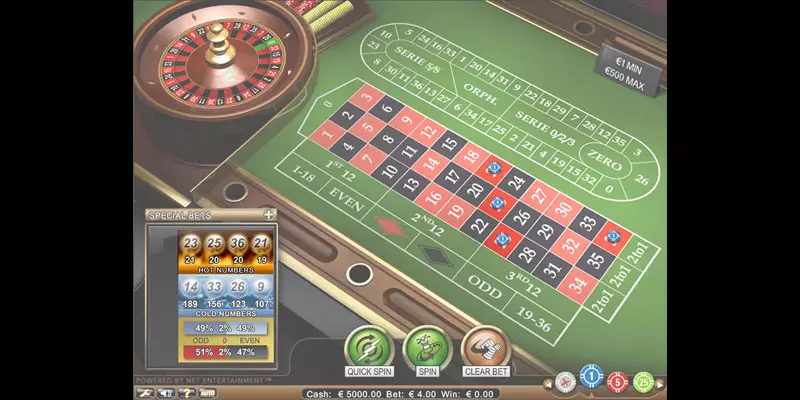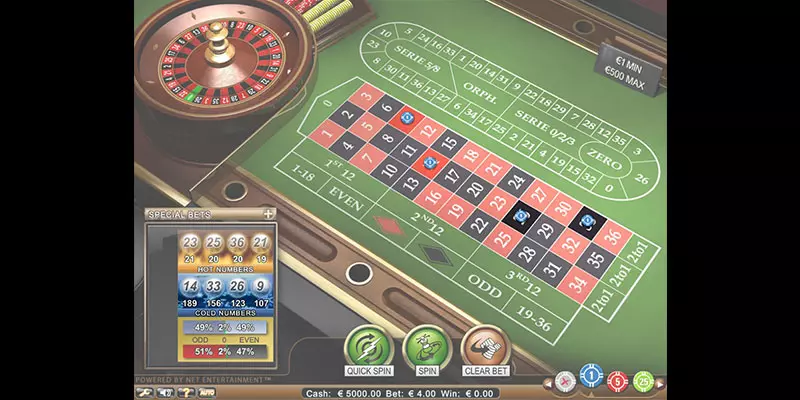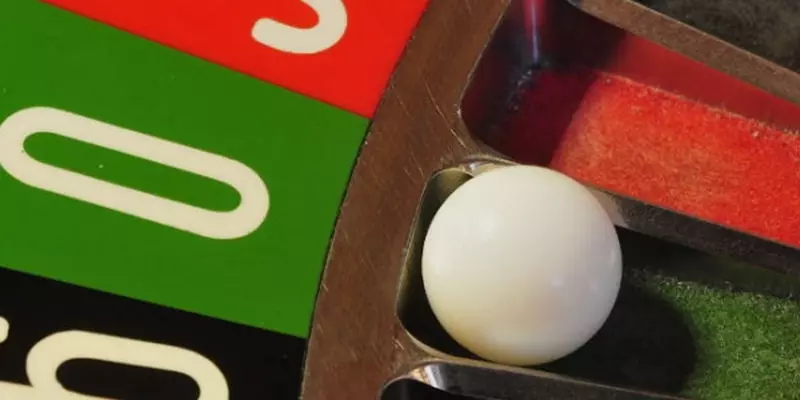Ever since roulette first gained popularity, players have tried to devise strategies that would help them correctly predict on which number the little white ball will land. It is important to remember that roulette is a game that revolves around chance, so no strategy can help you predict the outcome of the next spin of the wheel. Likewise, what happened in the past has no bearing on what will happen during the upcoming rounds.
Even more so, when one plays the game online, the outcomes of each round will be determined by a Random Number Generator. In land-based casinos, there are sometimes the so-called “biased” wheels, which further boost the edge the house holds over players.
One of the questions most players ask themselves when they join the roulette table is how to pick a number to bet on. This leads them to employ various techniques in an attempt to predict which number will win next.
While some players are guided by the idea of hot and cold numbers, others prefer betting on the action numbers. This article aims to cut the frills of this method of betting on roulette and to elaborate on its effectiveness.
What are Action Numbers?
Assuming there are no damages or imperfections and the wheel is not biased, the pockets on roulette wheels are of the same length and width. A biased roulette wheel produces results different from those dictated by chance. Generally speaking, the causes for this may vary, but on most occasions biases arise because of a manufacturing defect or the repeated use of the wheel.
It is worth noting that roulette wheels may exhibit section or pocket bias. Occasionally, dynamic bias can also be detected, but players should be mindful that it exists only for a short time.
Still, it is important to note that such biases will not be detected immediately; instead, a much closer observation of the wheel is required.
For the most part, roulette wheels are practically identical and the numbered pockets are arranged in the same sequence. Of course, this depends on whether you are playing American roulette or European roulette, as the arrangement of the numbers on the European wheel differs from that on the American wheel.
This is the case when players bet on the so-called action numbers. They are called “action” numbers because when the ball spins around the edge of the wheel, it typically lands on one of these numbers or in close proximity to one of them. Consequently, the action numbers are evenly spread around the wheel, which makes it unlikely for the ball to land on a number that is not covered.
The action numbers on a double-zero American wheel are as follows: 10, 11, 12, 13, 14, 15, 17, 18, 20, 21, 28, 29, 30, 31, 32 and 33. All numbers that are not included in this group are called “clicks”.

If you look at the wheel, you will notice that the numbers listed above are indeed spread so that they are never more than six pockets away from each other. Two of the action numbers have four “clicks” on one side. One of them is 14, which has two clicks on one side and four on the other. Likewise, number 33 has four clicks on one side and none on the other.
If you drop the ball at random into a pocket that does not contain an action number, you will notice that it still lands in close proximity to one of the action numbers in the group. In other words, the action numbers are spread so that they are “in action” or in play most of the time. In theory, you minimise your chances of losing because the probability of the white ball landing on one of these numbers is exceptionally high. Moreover, if you play the action numbers as a group, you can limit the amounts you stake until you start winning.
Perhaps the question you are asking yourself now is how to bet on these numbers. In fact, they can be grouped in different ways. For example, numbers 10, 11, 12, 13, 14 and 15 can be included in a double Street bet, so you would wager three chips between numbers 10 and 13. With action numbers 28, 29, 30, 31, 32 and 33, you can place a double Street bet and wager three chips between numbers 28 and 31. Meanwhile, numbers 17, 18, 20 and 21 form a Corner bet, so you would wager one chip on this group of numbers.
Needless to say, the payoffs offered to players will not be the same and will be determined by the winning number. Therefore, if one of the numbers included in the Street bet wins, players will be paid at a rate of 11:1. If the winning number is part of the Corner bet, however, the payout will be 8:1.
If you decide to give this betting approach a shot, you will boost your chances of winning by covering a considerable section of the wheel with fewer chips because a total of 7 chips will be needed so as to bet on these numbers. It is important to note that this is considered the most basic way of betting on action numbers.
Some gambling enthusiasts prefer to place a Six-line bet on numbers 31 through 36. To cover the rest of the action numbers, they simply place Straight-up bets.
This approach is also highly favoured by roulette fans because the wins they collect from their wagers can be much larger. As you probably know, when a Straight bet wins, you are paid at a rate of 35:1.

Hot and Cold Numbers
The concept behind hot and cold numbers is relatively simple. If a given number is spun more frequently in the last few draws, it is considered a “hot” number. With “cold” numbers, it is precisely the opposite – they have been spun less frequently in recent draws.
Betting on the Action Numbers
Roulette Money Management
Gambling Discipline
ROI and Return to Player
Best Casinos to Play Roulette
Betting on Hot Numbers in Roulette
As you can see, hot numbers are simply those that have been spun more frequently. According to systems that advocate betting on hot numbers, if a given number has been spun X times in Y spins, it is considered hot, and players should wager on that number for Z spins. It is important to note that hot numbers are not necessarily spun several times in a row; they just come up more often than cold numbers.
For instance, if number 24 has been spun five times in the last 36 spins, it is considered a hot number. You would then place flat or level bets on number 24 for the next 36 spins of the wheel or until the number is spun again. If you win with that number, you stop betting on it and wait to see which number becomes hot next.
If you play the game online, there will be no need to write down which numbers come up more frequently. Many online roulette variations display statistics regarding the hot and the cold numbers, providing players with all the information they need on which numbers have been spun repeatedly within a given period of time.
It is important to remember that just because a given number has come up five or six times in the last fifty draws, there is no guarantee it will be spun again soon.
The idea that some numbers are hot while others are cold is a fallacious belief that many roulette players fall prey to. If you are taking your first steps in betting on the game, bear in mind that a number will not become “overheated” simply because it has hit several times over several spins of the wheel.
Even if it appears to you that a specific event has occurred a disproportionate number of times, this should not lead you to think that its likelihood of recurring is reduced.
An essential detail many roulette lovers tend to overlook is that no matter how many spins of the wheel have taken place and which numbers have hit during the previous rounds, the chances of each number to become a winning one will invariably be the same.

Betting on Cold Numbers in Roulette
As mentioned above, numbers that have been spun less frequently in recent draws are referred to as cold numbers. They are sometimes called sleepers or overdue numbers. Many players prefer to place inside bets on such numbers because they believe that if a number has not been spun for a long time, it is overdue and will win on one of the next spins.
At first glance, this idea appears logical. Since the chances of any given number winning are 1 out of 37 (or 1 out of 38 on American wheels), one might expect each number to win on average once every 37 spins. If number 23, for example, has been a “sleeper” for the last 60 or 70 spins, it is expected to “wake up” and appear in the following spins. This is known as the “law of averages”, but it holds true only over very prolonged periods of time. In roulette, a long period means thousands of spins of the wheel.
If a given number comes up extremely rarely, this might indicate that the wheel in land-based venues is biased, either intentionally or unintentionally. For example, if number 23 has not been spun lately, this might suggest that the pad at the bottom of its pocket was replaced during routine maintenance. The new pad could cause the ball to bounce out of the pocket more easily and thus reduce the probability of number 23 being spun. As mentioned above, biases are a rarity nowadays because of the strict control to which roulette wheels are subjected.
No matter how tempting the idea may be, believing that a number which has not hit for a long time will certainly show up very soon is just as incorrect as the idea of hot numbers.

The Gambler’s Fallacy
Players who place even-money wagers or bet on hot and cold numbers often fall prey to the so-called “gambler’s fallacy”, the false belief that the outcome of random spins is affected by previous spins. Such players assume that if a given number has not come up for quite a while, it is bound to win on one of the following spins because it is “overdue”. Conversely, if a specific number has appeared more often in a given period, they believe its chances of appearing again on the next spin are smaller.
If you blindly base your decisions on the gambler’s fallacy, be prepared to lose money in the long run.
However, if you play the game on an unbiased wheel or online, where the outcome is determined by a Random Number Generator, the probability of 1:37 for each number coming up does not change from one spin to the next. After all, roulette wheels do not have a memory and do not favour some numbers over others.
The outcome of each spin is not affected by previous or subsequent spins. If the wheel is truly random, the probability of any given number coming up remains 1 out of 37, no matter when that number was last spun. That is why players are often advised to avoid placing Straight Up inside bets on sleepers or overdue numbers, especially when one considers that cold numbers can become hot after a certain number of spins and vice versa.
While betting on roulette, players should bear in mind that although the chances of a specific number hitting on the next spin are always the same, this does not mean that all numbers will hit if the wheel is spun 37 or 38 times.
During the course of these spins, gambling aficionados will notice that some numbers might come up two or three times, while others might not hit at all.
Players have likely heard the terms expectation and variance. To illustrate what these terms mean, let us consider a coin toss.
Needless to say, in a coin toss there are only two possible outcomes, heads or tails, which means the chances of either outcome occurring are 50%.
It is important to note, however, that if the coin is tossed a large number of times, expectation dictates that ultimately heads will occur approximately as often as tails. Despite each outcome having a 50% chance, players could toss the coin 100 times and see heads 20 times and tails 80 times.
This is exactly where variance comes into play: it describes how results deviate from the outcomes expected on average. A vital thing to remember is that the outcomes of random events such as the spins of a roulette wheel will not be evenly distributed over short periods of time.
Therefore, variance will tail off with each new spin of the roulette wheel or toss of the coin. Thus, avid casino fans should expect to see heads as many times as tails after a significantly larger number of tosses of the coin. The same applies to the game of roulette, which explains why basing your wagers on the belief in hot and cold numbers is completely misguided.
Another point casino enthusiasts should bear in mind is that not all types of bets are equally volatile. Naturally, wagers placed on individual numbers are the most volatile and are followed by Split bets. Because the chances of winning with Street, Corner or Double Street bets are not that low, such wagers sit in the middle of the volatility spectrum. The roulette wagers with the lowest volatility are the ones that pay even money.
If you are looking to make the most of your roulette session and land bigger wins, it is advisable to opt for wagers that cover fewer numbers. However, you should not forget that in such cases you will have a lower chance of winning. Conversely, if you wish to spend more time at the roulette table and reduce the possibility of losing, placing wagers that cover several numbers will be the way to go. As you might expect, your chances of securing a massive win will diminish significantly.
In other words, players should not get overly excited when they notice that some numbers are hot while others are cold. The main issue is that, in roulette, which numbers will remain hot or cold is highly unpredictable.
What Problems Does the Gambler’s Fallacy Create
It is a common occurrence for players to fall prey to the belief that the outcome of random events is somehow related to, and even influenced by, events that have already taken place.
This happens most often at the roulette table, where players tend to forget that the chances of each number hitting are invariably 1 in 37 or 1 in 38 for European and American-style roulette respectively.
Neglecting this essential detail might have a major impact on your bankroll, especially if you find it hard to remain disciplined during your betting session.
As gambling enthusiasts might already know, wagers placed on Red and Black pay even money, but the chances of each of these outcomes occurring are not exactly 50/50 because of the presence of the single and double-zero pockets. Still, this does not mean that the probabilities of a red or a black number hitting differ from one another.
Let’s assume that the small white ball has fallen into a red pocket during the previous ten spins of the wheel. One might then conclude that the ball will surely land in a black pocket next time. Although nothing could be further from the truth, you can still see players staking significant sums on black simply because red has come up several times in a row.
When gambling enthusiasts’ decisions are influenced by the gambler’s fallacy, they usually end up with drained bankrolls.

Gambler’s Fallacy and Roulette Betting Systems
Another widespread misconception is that applying a roulette betting system can give players a leg-up to win big.
Depending on the type of system, players may be required to increase the amount they stake when they lose and decrease it after a win, while other systems function in the exact opposite manner.
Although some systems based on positive progressions may be useful if players are content with smaller wins, they should bear in mind that, ultimately, using roulette betting systems is doomed to fail because they are not the key to massive wins. Systems based on negative progressions are even more unreliable, as they can quickly eat up a player’s bankroll, making it impossible to reach the point at which they turn a profit or recoup previous losses.
The main reason betting systems are flawed when applied to roulette is that they are built around the outcomes of previous spins.
Conclusion
Roulette is an exceptionally thrilling casino game and is immensely popular among both old hands and rookies. To ensure you have a whale of a time, avoid relying on betting systems and allowing the gambler’s fallacy to guide you.
When it comes to betting on action numbers, some players might enjoy this approach simply because their chances of winning are higher. Still, greater odds of winning translate into smaller wins, a detail that is worth noting.



